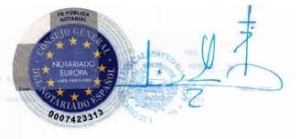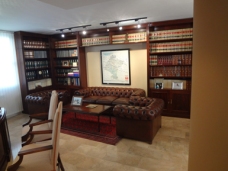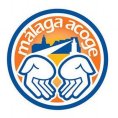Sounds like the beginning of a joke, doesn’t it? “A notary, a copy-shop clerk and an immigration advisor go into a bar …”. Sadly it was no joke. It was a week of admin and bureaucracy. And it was time-consuming.
My friends needed a very simple legal process carried out. Or so they thought. They needed their signatures witnessed so that a house sale in the United States could complete in their absence. They didn’t need any documents translated, they didn’t need any of the house sale documents notarised. They just needed a notary’s stamp to say “Yes, these are the original signatures of these two people”. Simple, no? No.
 I popped in to the notary’s office in the morning to get a rough idea of price, and to ask if we needed an appointment. “What’s it for?” the receptionist asked me. “Just to witness their signatures, nothing more.” “Yes but what will they be signing?” she asked me. I wasn’t sure – I hadn’t asked them. “Something to do with selling a house. Just their signatures, as they won’t be in the United States to sign on the day.” “Do you have the documents in Spanish?” “Well no, because all the parties and all the lawyers speak English” I replied, wondering if this was going to turn out to be a teeny bit more complicated than I had thought ….
I popped in to the notary’s office in the morning to get a rough idea of price, and to ask if we needed an appointment. “What’s it for?” the receptionist asked me. “Just to witness their signatures, nothing more.” “Yes but what will they be signing?” she asked me. I wasn’t sure – I hadn’t asked them. “Something to do with selling a house. Just their signatures, as they won’t be in the United States to sign on the day.” “Do you have the documents in Spanish?” “Well no, because all the parties and all the lawyers speak English” I replied, wondering if this was going to turn out to be a teeny bit more complicated than I had thought ….
The receptionist sighed, and sent me in to see Carmona. He had a big desk, as befits a notary. It had flags and symbols. Very legal, very notary-ish, very Spanish. He asked the same questions. I gave the same answers. I didn’t have any more information. He sighed too, and told me to come back at 5pm with them, and he would see us then. “They must bring passports and all the papers” he added.
We met outside. They had brought everything, including two friends who were staying with them from the UK. I asked if the friends wanted to go wandering up Málaga’s famous Calle Larios while we were doing the notary’s office, but they said they’d pop in with us, and do the touristy bits afterwards.
The receptionist recognised me and waved us towards Carmona’s desk. We waited outside on big squishy sofas while he finished with his previous client, and finally he waved us in. “These are the people I told you about. The lawyer in the United States JUST needs that their signatures be witnessed as genuine, as they are completing the sale and they cannot be there in the United States to sign in person.” “But what is the document?” he asked. “Well it’s just a short document confirming the sale, and it just needs their signatures, stamped by a notary to confirm that they have signed.” “Do you have a copy in Spanish?” he asked. “Umm, no!” So at that stage I had to take him through the document, paragraph by paragraph, translating it into Spanish. A tad more technical than I’d expected! I emphasised that the couple had a very good lawyer in the US and really just needed to sign the document in front of the notary and get it stamped. But it was not going to be as straightforward as that.
document?” he asked. “Well it’s just a short document confirming the sale, and it just needs their signatures, stamped by a notary to confirm that they have signed.” “Do you have a copy in Spanish?” he asked. “Umm, no!” So at that stage I had to take him through the document, paragraph by paragraph, translating it into Spanish. A tad more technical than I’d expected! I emphasised that the couple had a very good lawyer in the US and really just needed to sign the document in front of the notary and get it stamped. But it was not going to be as straightforward as that.
We all handed over our identification, which was photocopied, and our passport numbers entered into the computer. Carmona printed off a 5-page legal document in Spanish and asked me to explain it to my friends. Meanwhile, he made various changes to it on the computer, inserting their names etc, and inserting a paragraph about me as the translator, which was a bit daunting as I am very far from being that! Then he printed that version out and showed us where to sign. With great relief that we’d finally got there, we got our pens out to sign. “No!”shouted Carmona. “You have to sign in front of the notary!” Ummm ….“Are you not the notary?” we asked. “No!” he laughed, and proceeded to throw another massive great spanner into the works. “After you are here” he said, “You must go to another office the other side of the river to get the other stamp.” “WHAT?!?! What other stamp?” “The Stamp of The Hague” he intoned, giving it enormous importance. “And we can’t get that here?” we asked, incredulously. “No! There is only one in Málaga, you must queue separately there.”
and showed us where to sign. With great relief that we’d finally got there, we got our pens out to sign. “No!”shouted Carmona. “You have to sign in front of the notary!” Ummm ….“Are you not the notary?” we asked. “No!” he laughed, and proceeded to throw another massive great spanner into the works. “After you are here” he said, “You must go to another office the other side of the river to get the other stamp.” “WHAT?!?! What other stamp?” “The Stamp of The Hague” he intoned, giving it enormous importance. “And we can’t get that here?” we asked, incredulously. “No! There is only one in Málaga, you must queue separately there.”
We knew we had to get to the courier company before it closed, and we had already been at the notary’s office over two hours without actually seeing a notary. We decided quickly that all the lawyer in the US had asked for was an official witness to their signatories – we could do without the second stamp. Carmona looked shocked, and sent us back outside to wait.
Time ticked by. Their visiting friends were tapping their fingers on the sofa. Eventually an efficient-looking woman emerged and we followed her and Carmona into a grander office. She then read out the five-page document incredibly fast, and I summarised it again for my friends. Basically it identified them and me and listed our ID documents. It cleared the notary of any responsibility for the content of the documents related to the house purchase, absolved the notary of any responsibility for my translation, and also removed any responsibility from me (phew!) in case of my translation skills being somewhat below par. Finally everything was signed, and for the privilege of not being responsible for anything, the notary removed a large chunk of money from my friends.
friends. Basically it identified them and me and listed our ID documents. It cleared the notary of any responsibility for the content of the documents related to the house purchase, absolved the notary of any responsibility for my translation, and also removed any responsibility from me (phew!) in case of my translation skills being somewhat below par. Finally everything was signed, and for the privilege of not being responsible for anything, the notary removed a large chunk of money from my friends.
At the copy-shop which doubled as the DHL courier collection point, we discovered that we were part of “client practice” for a new trainee. Painstakingly-slowly and with more mistakes than there were words on the screen, she typed my friend’s details onto the DHL system. Copying from the passport, she typed “British Citizen” as the surname, and when I pointed this out, she said “But it says it here, in the passport”. I watched her like a hawk. These precious (and rather expensive) documents were being sent across the ocean based on a label typed by someone for whom writing her own name may be too arduous a task. We showed her the destination address. She entered the street where it asked for the recipient, the name of the company where it asked for the town, and then got stuck because the recipient’s name wouldn’t fit in the box clearly asking for the zip code. My anguished expression brought the manager over who slowly took the trainee through the process again. After what felt like an age, the precious DHL sticker was produced and the envelope sealed and (only slightly nervously) handed over to the trainee. It’s a good thing that people with learning difficulties are included in mainstream jobs, though it is mildly disconcerting when the manager takes a break during the crucial part of dispatching the envelope …..
ocean based on a label typed by someone for whom writing her own name may be too arduous a task. We showed her the destination address. She entered the street where it asked for the recipient, the name of the company where it asked for the town, and then got stuck because the recipient’s name wouldn’t fit in the box clearly asking for the zip code. My anguished expression brought the manager over who slowly took the trainee through the process again. After what felt like an age, the precious DHL sticker was produced and the envelope sealed and (only slightly nervously) handed over to the trainee. It’s a good thing that people with learning difficulties are included in mainstream jobs, though it is mildly disconcerting when the manager takes a break during the crucial part of dispatching the envelope …..
A couple of days later I took a Nepalese friend to the charity that helps immigrants in Málaga. Through a series of life changes, she had ended up without a valid visa after her student visa had expired. I phoned the charity in the morning to check their closing time and that there would be someone who could speak to my friend, who was coming to Málaga especially, from quite a way inland. “Yes that’s fine, we are open until 3pm and even if you arrive late there is always someone here to deal with emergencies.” That sounded really helpful, really supportive, and despite her difficult journey we walked quickly across the city and got there in good time before they closed. “Hello” I said to the four ladies in the office. “I phoned this morning, can someone come and talk to my friend?” Two of them started explaining to me in rapid Spanish that if it was an issue about a visa she would need to go to a lawyer and their lawyer was on holiday and there wasn’t anyone who could advise her. “Hang on, slow down! But I phoned this morning, and she has had a 3-hour journey to get here, can you at least come out and speak direct to her?” “Well, we aren’t legal advisors, she has to go to the lawyer.” “Please come and talk to her so that she feels someone is advising her.” “Well we’re not the advisors, and the lawyer who works here is on holiday.” “Right but can you at least explain that to her face?” Eventually one of the staff members came out to see my friend and gave her the details of the two other lawyers’ offices that would give her free advice and help her get her visa sorted.
four ladies in the office. “I phoned this morning, can someone come and talk to my friend?” Two of them started explaining to me in rapid Spanish that if it was an issue about a visa she would need to go to a lawyer and their lawyer was on holiday and there wasn’t anyone who could advise her. “Hang on, slow down! But I phoned this morning, and she has had a 3-hour journey to get here, can you at least come out and speak direct to her?” “Well, we aren’t legal advisors, she has to go to the lawyer.” “Please come and talk to her so that she feels someone is advising her.” “Well we’re not the advisors, and the lawyer who works here is on holiday.” “Right but can you at least explain that to her face?” Eventually one of the staff members came out to see my friend and gave her the details of the two other lawyers’ offices that would give her free advice and help her get her visa sorted.
It was frustrating, especially for my friend. But I was frustrated too, having described this organisation as one that could help her. Afterwards over a sandwich we agreed that it hadn’t been a complete waste of time, as we now had access to the free legal advice, but having worked for charities for thirty years I had just wanted them to treat her more as a human and less as someone to be bundled out of the office as quickly as possible. It was a clear reminder that (a) charities in every country are overloaded with work; and (b) immigrants and their problems are often given short shrift, making them feel a nuisance and a burden. Is there no time for a smile, a touch on the arm, and a word of encouragement?
None of these brushes with bureaucracy went smoothly. To be fair, the copy-shop trainee had successfully produced the address sticker, the envelope did arrive safely in the US for the completion of the house-purchase, and the lawyers there were perfectly happy with just the one stamp. But is there no simpler way to witness a signature? Should the copy-shop manager really have abandoned a not-very-competent trainee? Have the charity staff forgotten that their work is about humans, not about paper? And above all, how do people find their way through this maze of bureaucracy without speaking the language, and without having the whole day free just to complete one simple task?
 Back in the joke, the notary, the copy-shop clerk and the immigration advice-worker are in the bar arguing about paying the bill. The notary can’t pay unless the bill is stamped and witnessed, the copy-shop clerk can’t pay unless it’s in triplicate, and the immigration adviser can’t pay anything until the lawyer comes back from holiday. So their bar bill gets passed on to us. Same old story.
Back in the joke, the notary, the copy-shop clerk and the immigration advice-worker are in the bar arguing about paying the bill. The notary can’t pay unless the bill is stamped and witnessed, the copy-shop clerk can’t pay unless it’s in triplicate, and the immigration adviser can’t pay anything until the lawyer comes back from holiday. So their bar bill gets passed on to us. Same old story.
© Tamara Essex 2015 http://www.twocampos.com
THIS WEEK’S LANGUAGE POINT:
Known and unknown. Another key to the subjunctive. Imagine you are at work and you receive an order from a Danish client. You need someone who can read Danish, so you go out to the big office where all the secretaries are.
If you KNOW there is a secretary who speaks Danish but you don’t know who it is, you use the indicative (normal) tense … “Necesito la secretaria que sabe danés.”
If you don’t know whether what you want exists, you use the subjunctive. “Necesito una secretaria que sepa danés.”